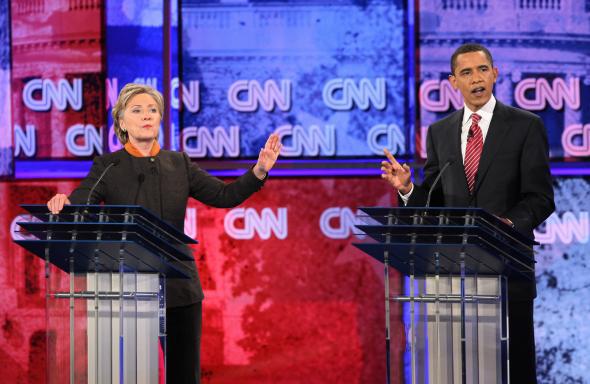Good news, Democratic longshots, dark horses, and also-rans: You’ll get the chance to go head-to-head with Hillary Clinton in front of a national television audience. The bad news: You’ll only get six cracks to derail the most dominant nonincumbent in history.
The Democratic National Committee announced this week that it has sanctioned six—and only six—primary debates, the first of which is set for this fall. The limited-but-not-too-limited slate approved by party officials is considered to be just what the doctor ordered for Clinton, who is currently trying to coast to her party’s nomination while pretending to break a sweat. As the Washington Post’s Chris Cillizza put it, “Clinton badly needs to avoid the appearance of a coronation, and a bunch of debates is a very good way to do that.” The events should also give Hillary the chance to shake off some rust in a relatively low-pressure environment before the general election, while maybe even generating some good press along the way.
DNC officials have also effectively barred candidates from partaking in non-sanctioned debates, a move that ensures there will be no repeat of 2008, when Clinton and Barack Obama squared off on stage more than 20 times. (The Republican National Committee made a similar power play earlier this year when it announced they’d hold only nine official debates.) The fact that the official Democratic party schedule conveniently aligns with Clinton’s game plan isn’t a coincidence: The committee’s goal, after all, is to make sure its eventual nominee enters the general election in the best shape possible, and you won’t find many people who believe that candidate will be anyone other than Clinton. The party’s progressive wing may be craving a full-throated policy debate, but the Democratic establishment has little to gain from having one.
Given Hillary’s massive polling and financial advantages, the debates will be the only time that her challengers will be on anything approaching equal footing with her. Spending six evenings sparing with Clinton on stage will provide the type of attention that most of her rivals couldn’t buy—but it will only level the playing field for a few hours at a time. They better hope they make the most of it.
The big question, now, is who exactly will end up on stage with Clinton. The DNC hasn’t said how it will determine which candidates get invited, but if the status quo holds they’ll need to get a little creative to make sure Clinton’s not up there all alone. In RealClearPolitics’ latest national polling average, the only Democrat not named Hillary who even cracks double digits is Elizabeth Warren (12.7 percent), and she’s said again and again (and again) that she’s not going to jump into the race. Joe Biden currently sits in third place (9.8 percent), but the vice president also appears increasingly unlikely to enter the fray.
That leaves a relatively ragtag group of underfunded and unknown politicians: Bernie Sanders (5.6 percent), the self-styled socialist senator who has already declared his candidacy; Martin O’Malley (1.6 percent), the former Maryland governor who is likely to jump in soon; Jim Webb (1.4 percent), the former senator and Navy secretary who continues to test the waters; and Lincoln Chafee (0.3 percent), the former Rhode Island governor who previously served in the Senate as a Republican.
And that’s where the news gets even better for Hillary. Sanders, the only candidate who’s more than a blip in the polls, has already made it clear that he’s not interested in attacking the front-runner, and is instead content to use his platform to tout his particular brand of economic progressiveness. When asked recently to weigh in on the current controversy concerning the Clinton Foundation and its foreign donors—a political gimme if ever there was one—Sanders briefly acknowledged he was concerned before quickly pivoting to the subject of the Koch brothers. As my colleague John Dickerson explained, “That is what Clinton allies do.”
O’Malley, meanwhile, has proven much more eager to launch broadside attacks. As politicians on both sides of the aisle have realized, attacking Clinton will get you noticed. But the former governor is doing more than just throwing punches to generate headlines; he’s trying to use those punches to define himself. As he put it on Monday during an NPR interview in which he took swipes at Clinton’s shifting positions on gay marriage and driver’s licenses for immigrants: “The bigger issue is do we have the ability as a party to lead by our principles or are we going to conduct polls every time we try to determine where the middle is on any given day?” Translation: I am principles, she is polls.
That makes O’Malley the odds-on favorite to come out swinging on a debate stage. But he may not get much help from the rest of the Democratic field, and he certainly won’t be getting any from the DNC.
